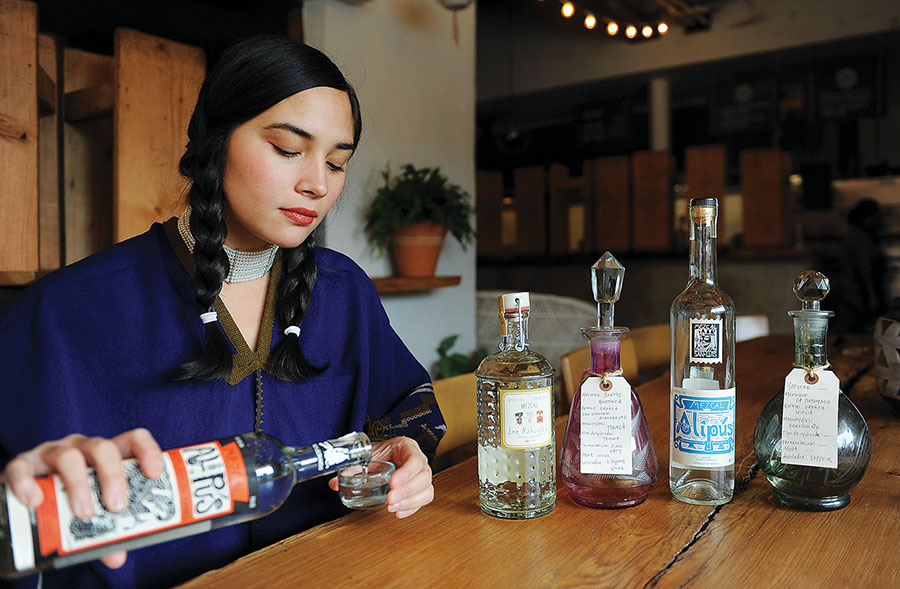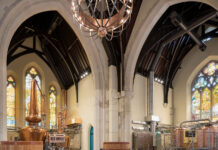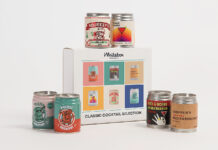
Born on Clark Air Force base on the Philippine island of Luzon (just outside Manila), Lane Harlan grew up a middle child, moving around the USA with her parents and siblings. She lived across the country in Texas, Nevada, California, North Dakota, Florida, New Mexico and Maryland. This nomadic, air force upbringing imparted global perspective and a sense of adventure and hard work, which eventually led to her opening two of Baltimore’s best and most revered bars, all while she was still in her 20s.
Lane has worked in restaurants since she was 15, from Denny’s to old-school fine dining, where her first love on the drink side was wine, followed by Belgian beer, then falling fully for amari and all things dank and complex. Though she created a “saffee” cocktail (hot sake and coffee) while working at a hibachi grill-style chain restaurant, she didn’t actually get behind the bar until she was in her 20s, moving quickly up the ranks from barbacking to bartending.
She gained experience at Brass Elephant in Mount Vernon and then at Jack’s Bistro in Baltimore’s Canton neighborhood while schooling herself on technique by watching Jamie Boudreau (of Canon in Seattle) videos on YouTube. She gained further knowledge by mixing drinks on the spot suited to customers’ preferences and palates. This honed her hospitality, her intuition and her cocktail craft.
After studies and travels in Paris and beyond, Lane moved back to Baltimore in 2011 and opened
WC Harlan in 2013. The bar’s magical, 1920s-spirited, candlelit setting, as well as its impeccable cocktails, glassware and vintage amari, took Baltimore by storm, setting a standard in the city for world-class bars.
In 2015, her passion for all things mezcal and Mexico led to the opening of Clavel (www.barclavel.com), around the corner from WC Harlan, both in Baltimore’s Remington neighborhood. Here her team cooks all manner of tacos, from lengua (beef tongue) to huitlacoche (corn fungus) in handmade tortillas, and pours from a stellar mezcal collection in a rustic, spare space that recalls California and Mexico, with special bottles brought back directly from Oaxaca for hardcore mezcal fans and an in-depth menu to school the novice or curious.
In her own words, Lane talks about why it’s important to hire “emotionally intelligent” staff, what is exciting her now in craft spirits and what advice she’d give to distillers seeking placement in key bars.
What led to your path as a bar manager?
I do what I want. This motto has been in my brain forever. I grew up traveling from air force base to air force base all over the country. This nomadic childhood exposed me to different ways of seeing and creating. Over time, I realized my passion for discovering pleasure, whether it be from traveling across the world, biting into a freshly baked macaroon filled with foie gras cream or smelling a natural wine for the first time. I wanted to share with other people the pleasures I felt in my brain. At age 26, I opened my first cocktail bar [WC Harlan].
What do you consider your bar style and how does living in Baltimore determine or affect that?
My style with my first bar has always been different than with my second. It’s almost like how you treat your children. WC Harlan was the baby I groomed and stayed with over countless nights — sleeping on a blow-up mattress on the floor and suffering cocktail shaking-induced carpal tunnel syndrome in both my wrists. I put my romantic sensibility and impulsive creative energy into the menu. We simply had a Cocktail du Jour [cocktail of the day] every day, “light” or “dark” beer on draught and “red, white or sparkling” wines served in nameless carafes. I had 100% creative control.
At some point the people working for you become your family. You begin to work together and they begin to make you proud. I felt these feelings when I opened the mezcaleria [Clavel]. I hired the most emotionally intelligent people I could find. I taught them the power of collectivity from day one. Even our first menu was an amalgamation of ideas. When we made bitters, I took them “shopping” in my “bitters store,” letting them smell and touch from dozens of botanicals falling out of my backpack. I took them all to Oaxaca and, once again, shared the pleasures I felt inside my brain.
What is your philosophy on deciding what brands to stock at your bars and what mix do you prefer of large and small brands?
At Clavel, I only carry mezcals that are artisanal and ancestral. We have a very small tequila collection consisting of a mix of highlands and lowlands tequilas produced using traditional methods. The bottles go through a strict vetting process because mezcal is about people and plants and I want the process of how they merged into the most beautiful thing you could drink to be transparent. By mid-2017, my mezcaleria will only carry mezcal [from producers and distilleries] that I have personally visited.
How do you educate customers on brands they might not have heard of?
We put the bottle in front of them and have a conversation through smelling and tasting with them. Education is never effective until you start a conversation — preferably over a glass.
What advice would you give to distilleries looking to be represented in quality cocktail bars?
Tell your story. Make a solid product. Know your market.
What are some micro-distillers/small-batch brands that are exciting you right now?
[Mezcal] Vago. Judah Kuper bleeds passion. He chooses his people well. He works with two maestros who are creating some of the most gorgeous mezcal on the market. The maestros are [as different as] night and day but their attention to their own land is present in the quality of agaves being used.
Baltimore Whiskey Company, [which is] owned by Max Lents, Ian Newton and Eli Breitburg-Smith here in Baltimore. I just tasted their Green is Gold Apple Brandy that was aged in rye and French oak port barrels — it was heavenly. I was like, “When can we get this?” and they were like, “Never! We are only selling the 500 bottles from our distillery.” They aren’t afraid to experiment and do super-small-batch runs. I’m currently working with them on a digestif. I feel proud to have them in the neighborhood.
Besides your bars, what do you think are some “can’t miss” food and drink spots when people are visiting your city?
Pete’s Grille on Greenmount Avenue. You walk in and there is a diner counter, a man at a flat top, and two women burning waffles and pouring coffee — real coffee. The kind you can drink even while you’re eating.
Also, Peter’s Inn in Fells Point. It’s a classic example of a small, historical row home turned first-floor restaurant, owned and operated by Bud and Karin Tiffany. They cook there, party there and make their own rules. It’s a Baltimore classic.”








